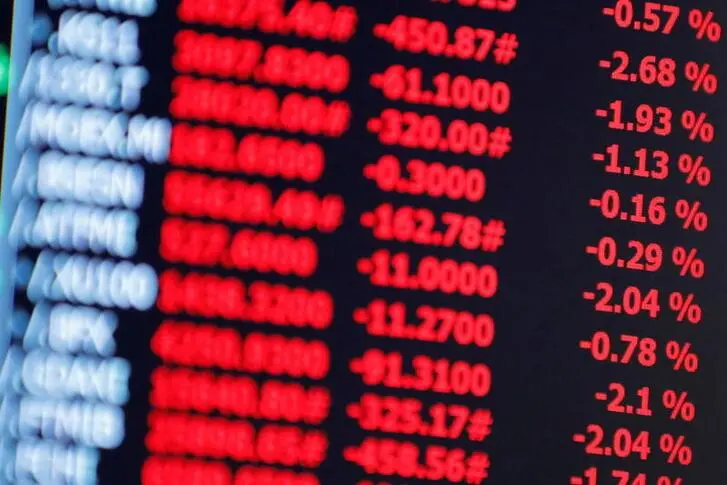PHOTO
LONDON- European stocks fell heavily again on Friday as worries about a sudden halt to central bank stimulus and rising tensions between Western powers and Moscow drove one of the worst ever starts to a year for world stock markets.
Strong earnings from Apple provided some encouragement for battered tech and U.S. markets, but traders were struggling to draw a line under a global selloff that has now firmly taken root.
The pan-European STOXX 600 tumbled nearly 1.5%, on course for its fourth straight weekly drop, EU while volatile U.S. futures prices indicated traders weren't exactly sure which way Wall Street will go when it opens shortly. .N .
MSCI's 50-country main world index is now down 8.1% for the month, slicing roughly $7 trillion from its value and putting it on the brink of its worst January since the 2008 global financial crisis year.
The dollar, meanwhile, is on track for its best week in seven months on bets that U.S. interest rates could now go up as many as five times this year.
"With the Federal Reserve sounding a lot more hawkish, it has shaken the markets," said Jeremy Gatto, a multi-asset portfolio manager at Unigestion in Switzerland.
"Markets can live with rate hikes, but the main question remains around the balance sheet," he added. Markets have been driven up by all the stimulus pumped in during the COVID-19 crisis, "so if it starts reducing liquidity, that changes the game".
The Fed indicated this week that it is likely to raise rates in March, as widely expected, and reaffirmed plans to end its pandemic-era bond purchases that month before launching a significant reduction in its asset holdings.
The prospect of faster or larger U.S. interest rate hikes, and possible stimulus withdrawal, lifted the dollar to a 20-month high of $1.1119 per euro and to 115.50 yen - close to a high of year so far of 116.35 yen JPY= .
In the big government bond markets that drive global borrowing costs, benchmark 10-year U.S. Treasury yields dipped to 1.82% from 1.84% earlier as the Fed's favored inflation gauge, the core personal consumption expenditure (PCE) price index, rose no more than had been expected.
In the 12 months through December, the PCE price index increased 5.8%. That was the largest advance since 1982 and followed a 5.7% year-on-year increase in November.
The two-year yield, which is even more sensitive to rate hike expectations, was last at 1.20%, having started the year at roughly 0.75%.
European bond yields also rose further. Germany's 10-year yield, the benchmark for the euro zone, was up 4 bps to -0.0008% as it threatened to break through the key zero threshold.
Focus was also on Italy, where bond yields there were also up as its parliament struggled to elect a new president.
OIL PRESSURE
U.S. stock futures recovered from an earlier dip to be broadly flat after the inflation data and as Apple shares, which have slumped nearly 10% this month, jumped 3.5% in premarket trading after posting record sales for its flagship phones.
Apple is the world's largest company by market value but it and other tech shares have been hit particularly hard in the current selloff as the prospect of global rate rises give those who were already worried about stratospheric valuations the perfect reason to sell.
In the commodity markets, oil prices remained strong and set for their sixth weekly gain amid concerns about tight supplies as major producers continue to limited output despite rising demand.
Brent crude LCOc1 futures climbed 1.9%, to $91 a barrel - its highest level since October 2014.
A sixth week of gains will also mark the longest weekly winning streak for Brent since October last year, when prices climbed for seven weeks while U.S. WTI prices gained for nine.
This year, prices have risen about 15% amid geopolitical tensions between Russia, the world's second-largest oil producer and a key natural gas provider to Europe, and the West over Ukraine, as well as threats to the United Arab Emirates from Yemen's Houthi movement that have raised concerns about energy supply.
"Where Brent crosses the $90 level, we see some selling from a sense of accomplishment, but investors start buying again when the prices fall a little as they remain cautious about possible supply disruptions due to rising geopolitical tensions," said Tatsufumi Okoshi, senior economist at Nomura Securities.
"The market expects supply will stay tight as the OPEC+ is seen to keep the existing policy of gradual increase in production," he said.
The market is focusing on a Feb. 2 meeting of the Organization of the Petroleum Exporting Countries (OPEC) and allies led by Russia, a group known as OPEC+. It is likely to stick with a planned rise in its oil output target for March, several sources in the group told Reuters.
(Additional reporting by Rowena Edwards; Editing by Andrew Cawthorne and Mark Heinrich) ((marc.jones@thomsonreuters.com; +44 (0)20 7513 4042; Reuters Messaging: marc.jones.thomsonreuters.com@reuters.net Twitter @marcjonesrtrs))
((To read Reuters Markets and Finance news, click on https://www.reuters.com/markets/ For Reuters Live Markets blog on European and UK stock markets, please click on: LIVE/ ))





















